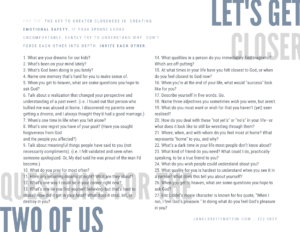
Let’s get real. You may be even a little too busy to read this post.
Or maybe you’re tired of picking up things with a lot of pieces. Or trying to find the owner of the toenail clipping on the table. (These have all been me.)

Let’s get real. You may be even a little too busy to read this post.
Or maybe you’re tired of picking up things with a lot of pieces. Or trying to find the owner of the toenail clipping on the table. (These have all been me.)

When my four kids were little and life resembled a 24-hour Bounty commercial, I read a statistic in Parents magazine that something like 78% of new moms, when choosing between sex and sleep, chose sleep.
Um. Duh.

Before my husband’s last (pre-COVID) international trip, I realized one of the things I miss most about him.
As he was packing–so methodical, everything in precisely-sized containers, shirts carefully folded over a packing template–I told him quietly, “See, you humanize me.”
Reading Time: 4 minutes

Minor confession: In the midst of putting out our family’s prayer letter last week…I declined a call.
My husband walked into the kitchen, and I had this look like your dog would when it pees on the carpet.
I explained my sheepishness. “Why do you feel guilty about that?” he asked, direct as ever.
“I want to be the kind of person who will drop everything and be present with whoever needs it,” I shrugged.
His eyes had this kind look around the edges. “You know you can only be present by shutting other stuff out, right? You’re present with our financial supporters [my husband and I are supported missionaries with Engineering Ministries International] right now. When you’re present with someone else, you’re shutting out other things you could be paying attention to.”
I literally thought about the post I wrote about being distracted with others–and how to be fully, powerfully present. We all know what it’s like to compete with headphones or a smartphone.
So often in my attempts to be everywhere, to be everything to everyone, I’m not “all there” with anyone.
So to be present, it’s fair to say there are boundaries involved.
When it comes to Christmas, being present with God is sucked away by schedules and material stuff and worry: the cares of the world and the deceitfulness of riches and the desires for other things enter in and choke the word, and it proves unfruitful (Mark 4:19 ).
).
The Psalmist prays, Unite my heart to fear your name (Psalm 86:11


I’m just not all there with him.
So I’m pulling ideas together to help me/you hone in on being “all there” this Christmas, starting with our audience of One.


To an already-packed schedule, Christmas can feel a bit like “more bricks, less straw.”
If your goal is being present in the ways that matter, cut out a few of the “have-to’s” that aren’t.
Could we do photo Christmas cards rather than hand-signed…or let go of cards altogether? Could I forego making frosted Christmas cookies if the kids really don’t care about it, or would probably fight the whole time? Do we have to have handmade gifts for teachers, or could we go with Starbucks cards?
Allow a little more margin for a peaceful, thoughtful state of mind rather than one rattled, and sprinting to keep up. Think Martha versus Mary here.
Pray that God will open your eyes to what entangles and distracts your heart from really soaking in the Christmas message this year—and that you’ll have the courage to cut it loose.
(…Or decline the call.)
If you’re moved by music, spend a few dollars and a few extra minutes on iTunes for songs that will get worship rolling around in your head and your heart.
an advent devotional, like this one from Desiring God.
Or if you’d like some more specific, personal questions, try Deeper: 12 (Printable) Journaling Ideas for a Christmas of the Soul.
Kids can learn being present with God, too. Consider an advent calendar that—alongside the ubiquitous sugar—leads your family closer to Jesus. I like this printable one from Faith Gateway.
Younger kids might enjoy making Jesus a birthday cake (cake mix! whipped cream! Keep this easy…) and singing “Happy Birthday” on Christmas.
Pick one name of Jesus (“Prince of Peace”) or verse (“I am the Lord’s servant; may it be to me as you have said”) or character from the Christmas story that sticks out. Or ask God to point out one.
Chew on that as you go through the season, and listen as God fleshes out its meaning.
Author Gary Thomas writes of the various ways we worship as individuals: through nature, restoring justice, through our intellect, etc.
Carve out time for the ways you worship, being present through a walk in the snow, a prayer time in the quiet of the Christmas tree lights, or shoveling a neighbor’s snow.
You’ve heard the old warning: If the Devil can’t make you bad, he’ll make you busy.
This may seem like a “duh”—but consider a question like this one: God, I know how everyone else thinks I should spend my day today. How do you want me to spend it, to be faithful to you and love well? And Help me know how my holiday can be about increased worship and enjoyment of You.
Help me keep the main thing the main thing.
(I pulled these together for FamilyLife.com. It’s got even more specific ideas.)
All There: Tips on Being Fully, Powerfully Present
All There: Tips on Being Fully, Powerfully Present with God (FREE PRINTABLE)
Reading Time: 7 minutes


My father is the broad-shouldered, strong, internal teddy bear type, with fingers like sausages. In my childhood, he was a Midwestern farmer. In his spare time, he donates his mad skills to car repairs of missionaries, single moms, people like that. He’s that kind of guy.
And it’s common for him to come back into the house with blood zigzagging down his leg or seeping through his shirt.
The part that amuses me?
Most of the time he’s baffled when someone points it out. I’m bleeding? Where?
The guy has low body sensitivity to the nth degree. Soft heart. Kevlar body.
In my own way, I’m a version of this. I am an enneagram 2. This is to say, I am hyper attuned to the needs of others. I personally, subconsciously block out my own, as well as emotion and all that.
In fact, I tend to associate my needs with shame.
I could have metaphorical blood ruining things I touch, smearing on people I love, and the annoyance of some vague discomfort interfering with my relationship with God.
And often I’d be shocked to realize it’s there.
Peter Scazzero reminds us,
When we do not process before God the very feelings that make us human, such as fear or sadness or anger, we leak. Our churches are filled with “leaking” Christians who have not treated their emotions as a discipleship issue.*
Which is perhaps why a “secular” practice–mindfulness–has been a game-changer in my relationship with God and other people.
Maybe I’ve already alienated a few of you with my reference to the enneagram, which has drawn both legitimate Christian praise as well as concern. Mindfulness, too–even “Christian” mindfulness–draws understandable praise and concern.
Essentially, mindfulness is a form of holistic awareness. An observance of ourselves.
The dictionary defines it as “a mental state achieved by focusing one’s awareness on the present moment, while calmly acknowledging and accepting one’s feelings, thoughts, and bodily sensations, used as a therapeutic technique.”
Christian mindfulness takes many avatars for me–like solitude, meditation, and simply being present with God (don’t miss this post and free printable).
I’m currently using a very basic workbook to help me every morning. It asks me the same questions every day.
At the end of the day, it asks
I actually love this practice–and sometimes it has a way of pivoting my quiet time.
As I wrote in this post, it wasn’t uncommon for me to engage in time with God, but then later find myself crying because of something I’d never acknowledged or dealt with in his presence.
Think of sitting down with a friend for coffee, but never touching on what’s actually pricking our souls. Like anyone would do that. (Pro tip: Our ability to be present with God profoundly affects our ability to be present with others.)
My husband, who I associate with safety, has a way of tugging my stomped-down emotions and experiences to the surface. I think about this, and crave more of it in my relationship with God.
As Jen Pollock-Michel writes,
communion with God…is intended to be as intimate as sexual love. Prayer is meant for undressing us, for making it possible for us to know and be known by God. Pretense in prayer is a lot like kissing with your clothes on.**
Part of this “kissing with your clothes on”, for me, is in part because of my approach to God; to change in my own heart. Before, I have to come to God believing change happens within me when I learn.
Too many church services are often structured this way: to help us think or act, but not to begin with listening. Being. Bringing the entirety of our human experience into worship.
But as James K.A. Smith warns,
What if, instead of starting from the assumption that human beings are thinking things, we started from the conviction that human beings are first and foremost lovers? What if you are defined not by what you know but by what you desire? What if the center and seat of the human person is found not in the heady regions of the intellect but in the gut-level regions of the heart? How would that change our approach to discipleship and Christian formation?***
So taking time to “fix my eyes on Jesus”–as well as how he’s interacting with my heart, the interplay between us–changes our relationship.
As John Calvin famously penned, “Without knowledge of self, there is no knowledge of God.” Practicing Christian mindfulness, welcoming God into the intensities and sometimes fickle fluctuations of my internal world?
It’s caused me to love him more.
I deal with my stress in God’s presence, I tend less to visit those sublimated emotions on family. (My frustration in that conflict at work. Exhaustion, with which I need God’s help. My sense of being overlooked or unappreciated…).
Then, I seek that appreciation or peace or stamina or identity from God–rather than ramming outer control forward for an inner chaos.
Rather than blustering in to “listen” to a friend? I can set aside my agendas and cravings, and just be with them.


Mindfulness doesn’t have Christian roots per se–barring God’s constant commands toward alertness, meditating on God’s Word, awareness of our own hearts.
In that sense, “Christian mindfulness” is something to which God called us far before Buddhism took a breath. (Check out verses like Psalm 139:23-24, Romans 12:2, Mark 14:38, 1 Corinthians 4:4, Psalm 19:14, 1 Peter 5:8, and 2 Corinthians 10:5, for starters.)
Mindfulness in the secular sense can potentially lead to
self for answers and disproportionate focus, rather than tuning the knobs of our hearts to God. As this article points out, the answers really are not within ourselves. Jesus is the light, truth, and way our hearts crave (John 8:12, 14:6).
“emptying the mind”–which reminds me of the dangers of being drunk/out of control, rather than under the control of the Holy Spirit (Ephesians 5:18). That vulnerability can also lead to influence by our mutual Enemy (1 Peter 5:8). Mindfulness can be used for greater awareness of reality rather than escaping it.
I should acknowledge that using these methods is my own personal decision, borne out of my conviction that even what’s been used by other religions for evil can be used by Christians for good.
Paul seemed to examine similar convictions between those who felt comfortable eating meat sacrificed to idols, and those who didn’t.
Upon examination–I exercise with workouts created by non-believers, perhaps who make fitness a kind of religion. I take medicines invented by doctors who exalt science. In Africa, I used the muezzin’s call from the mosques as a routine reminder to pray for Muslims’ salvation.
But as Augustine famously writes, all truth is God’s truth.
In short, my thought is to be like the Israelites before they left Egypt. They sought riches from their enslavers, and put that wealth to use for God and His people (Exodus 12:36).
Personally, I use these methods only to increase my own worship of God.
But I write this post with trepidation (…and procrastination). I understand the potential for other believers to stumble if other than Christian mindfulness methods are used for anything but his purposes.
Mindfulness isn’t just for enneagram 2’s! Threes have a difficult time acknowledging emotion. Sevens avoid pain. Ones may motor past emotion to get to the “right thing to do”–and forego doing that right thing from the heart. You get the idea.
So tonight, take a few moments to be. To realize where you’re bleeding, or simply what made your heart sing today.
In a very real sense, Christian mindfulness preaches the Gospel to us all over again: That we are not what we do or learn or know. Jesus’ work on our behalf makes me enough, allowing me to approach God with my whole self (Hebrews 4:16).
But before we spoke a word–and in spite of profound humanness–we have been loved. Sought after. Known.
10 Questions to Take Your Relationship with God Deeper, Set #1
Your [Spiritual] Quarantine Self-Checkup
10 Dashboard-light Questions: The Stressed Version of Myself
All There: Tips on Being Fully, Powerfully Present–with God (FREE PRINTABLE)
* Scazzero, Peter. Emotionally Healthy Spirituality: Unleash a Revolution in Your Life in Christ. Kindle Edition.
**Surprised by Paradox: The Promise of And in an Either-or World. Downers Grove, Illinois: Intervarsity Press (2019), p. 166.
***Smith, James K. A.. You Are What You Love. Grand Rapids, Michigan: Baker Publishing Group, p. 7. Kindle Edition.
© 2024 THE AWKWARD MOM
Theme by Anders Noren — Up ↑